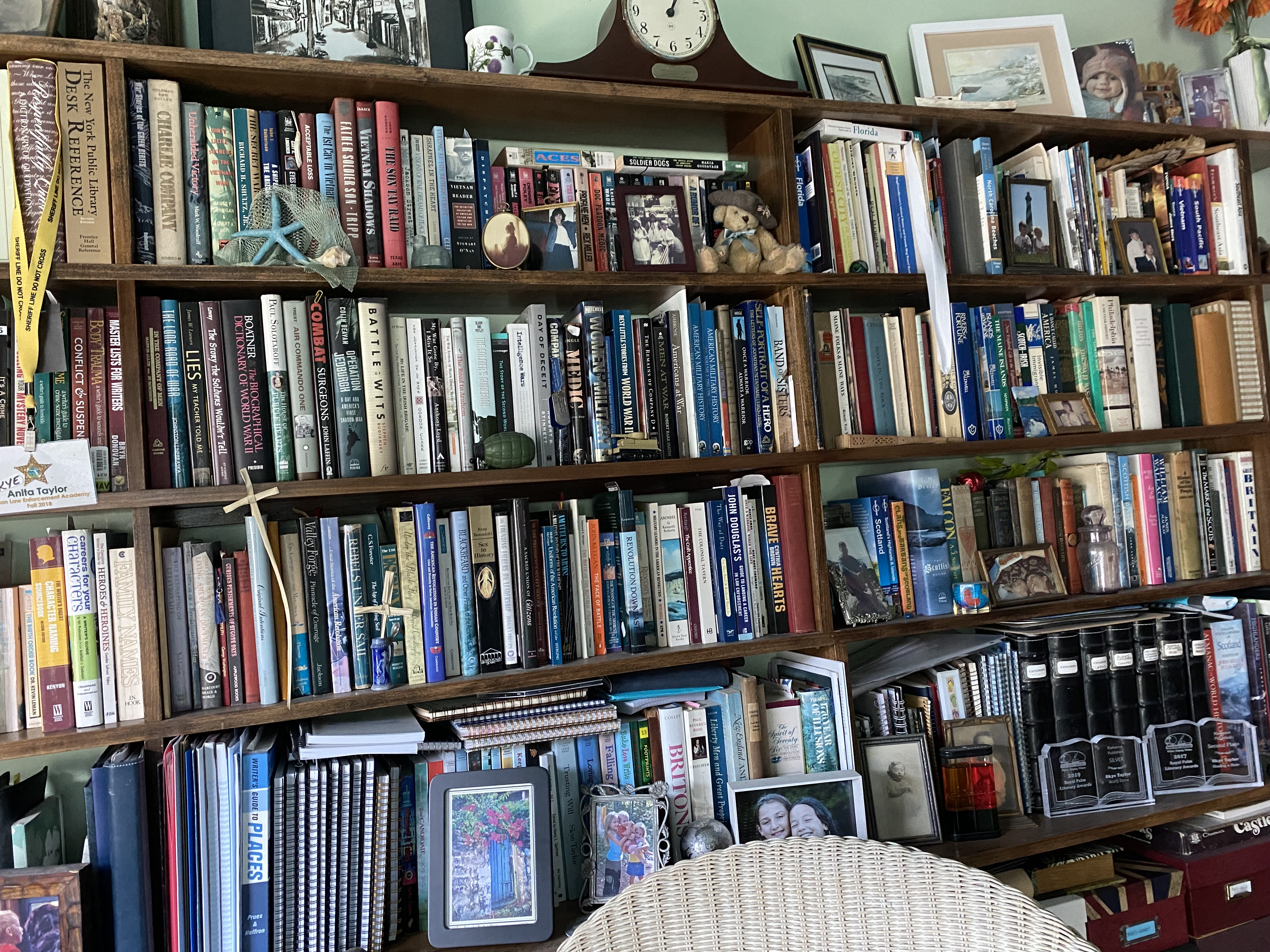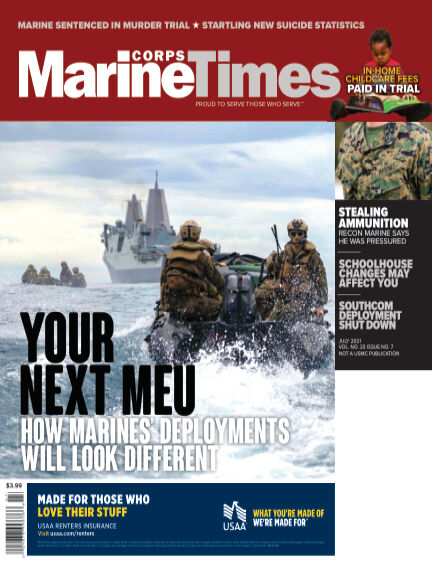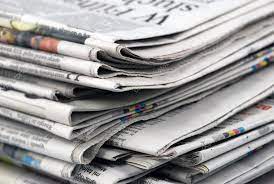 Round Robin Blog Hop for April 2022: How much reading do you do, both for pleasure and for a work in progress?
Round Robin Blog Hop for April 2022: How much reading do you do, both for pleasure and for a work in progress?
XX
 If you were to poke about my wee house, you wouldn’t be asking how MUCH I read, but rather when do I find the time? Even in the bathroom there is a small wood rack my dad built for me to keep reading material handy just in case I might be there long enough. On my bedside table there are several books just in case I finish whatever I was reading and don’t want to get up and look for something else. The end table next to my recliner has a
If you were to poke about my wee house, you wouldn’t be asking how MUCH I read, but rather when do I find the time? Even in the bathroom there is a small wood rack my dad built for me to keep reading material handy just in case I might be there long enough. On my bedside table there are several books just in case I finish whatever I was reading and don’t want to get up and look for something else. The end table next to my recliner has a  stack of what I consider my “Read Now” stuff but there are also a couple items on the ottoman and an overflowing magazine rack. And we haven’t even gotten to my library/study. Or the astonishingly long file of yet unread books on my Kindle apps or the almost as long list of audio books on my phone. So, I guess the short answer to the first part of that question is A LOT!
stack of what I consider my “Read Now” stuff but there are also a couple items on the ottoman and an overflowing magazine rack. And we haven’t even gotten to my library/study. Or the astonishingly long file of yet unread books on my Kindle apps or the almost as long list of audio books on my phone. So, I guess the short answer to the first part of that question is A LOT!
XX
Most of the places I’ve mentioned are all books for pleasure. But I do a fair amount of reading both for research on a book I’m planning to write and on the craft of writing. All those books are generally in print, many on my bookshelf beside my desk and some from the library.  I’ve also been known to subscribe to a periodical just because it is related to something I am writing and just might give me unexpected information I wasn’t aware I needed.
I’ve also been known to subscribe to a periodical just because it is related to something I am writing and just might give me unexpected information I wasn’t aware I needed.
XX
When I was writing Healing A Hero I had a subscription to Marine Times, because my hero was an active duty Marine and I needed to know what was going on in the world of Marines at the time. I am a pantser, as I’ve mentioned before, so while I knew how the story ended, there were details I would learn along the way. It was a second chance at love story, and as I wrote, I realized I needed a logical reason why my hero and heroine lost touch fourteen years earlier. In a world of email and cell phones it was hard to come up with a reason that didn’t stretch the imagination so the problem niggled at my mind as I wrote. Then the next issue of the Marine Times arrived and the front page story was of a Navy ship being decommissioned after years of service. Two men, a sailor and a Marine who served aboard her were interviewed and there was my answer! How amazing that this ship had just made port in Brisbane Australia and the Marines given shore leave when the towers in New York were hit on 9/11. The Marine interviewed told of having just ordered up a steak at a bar on main street when MPs from the ship came running through the town ordering all personnel back on board so the ship could leave port immediately. Adding to his story, he revealed that none of the  sailors or Marines on board were allowed to call or email their loved ones because no one was to know where that ship was headed. I had my answer!
sailors or Marines on board were allowed to call or email their loved ones because no one was to know where that ship was headed. I had my answer!
XX
Sometimes my research is historical in nature. I grew up near Boston and spent many hours poking about the historic sites, but even so, when I was writing Iain’s Plaid, I needed to find details that aren’t the stuff of legend. So, I spent more time IN the  city exploring, but also reading a variety of sources including journals and letters from the day, written by men and women on both sides of the coming conflict (1775.) When writing The Candidate, I delved into research on our involvement in Vietnam to learn just what it might have been like for my protagonist, Matt Steele, both to be there, to
city exploring, but also reading a variety of sources including journals and letters from the day, written by men and women on both sides of the coming conflict (1775.) When writing The Candidate, I delved into research on our involvement in Vietnam to learn just what it might have been like for my protagonist, Matt Steele, both to be there, to  witness the fall of the embassy and his re-entry into our less than welcoming country at the time. To get the feel of a historical setting, it’s not enough to just know the history, but a writer needs to have a grasp of the minute details of daily life; like what they ate, and how they dressed and even the way they spoke. It takes patient reading to learn all this stuff.
witness the fall of the embassy and his re-entry into our less than welcoming country at the time. To get the feel of a historical setting, it’s not enough to just know the history, but a writer needs to have a grasp of the minute details of daily life; like what they ate, and how they dressed and even the way they spoke. It takes patient reading to learn all this stuff.
XX
 When we all began to write, we were given the wise advice to “write what you know.” Which is a fine way to begin and depending on genre doesn’t take a lot of research. If you’re writing a romance and your heroine is a teacher and you spent the last 20 years teaching, you probably don’t have to research much. I’m not saying John Grisham didn’t do his research, but he was a lawyer for a decade and a state representative for another decade so he had tons of personal knowledge and insider info to base his best-selling courtroom dramas on. But for most of us, we eventually
When we all began to write, we were given the wise advice to “write what you know.” Which is a fine way to begin and depending on genre doesn’t take a lot of research. If you’re writing a romance and your heroine is a teacher and you spent the last 20 years teaching, you probably don’t have to research much. I’m not saying John Grisham didn’t do his research, but he was a lawyer for a decade and a state representative for another decade so he had tons of personal knowledge and insider info to base his best-selling courtroom dramas on. But for most of us, we eventually  wear out the personal knowledge we have and start looking for other careers and lifestyles for our heroes and heroines. And so the research begins again. We can’t all be in law enforcement, or work in hospitals, fight wars, spy on foreign governments or wear chaps and ride the range, so we research which means more reading. A LOT more reading. Some authors end up so in love with all their research they turn a 300 page story into a 900 page novel, but for most of us, it means taking copious notes from dozens of sources and then cherry-picking the best of the details to make our stories come alive and feel real.
wear out the personal knowledge we have and start looking for other careers and lifestyles for our heroes and heroines. And so the research begins again. We can’t all be in law enforcement, or work in hospitals, fight wars, spy on foreign governments or wear chaps and ride the range, so we research which means more reading. A LOT more reading. Some authors end up so in love with all their research they turn a 300 page story into a 900 page novel, but for most of us, it means taking copious notes from dozens of sources and then cherry-picking the best of the details to make our stories come alive and feel real.
XX
 So, for me, the answer is lots and lots of reading. In addition to reading for pleasure and reading for research, I also beta read for others and I’ve judged for contests. I critique other authors as well and all that takes a big chunk of time spent reading. And then there’s the news. I don’t trust the media very much, especially not what is presented on the television which, seems today to be chosen more for the shock and awe factor or to sway people to one point of view or another. So, I read a variety of sources to find out what is really going on in my world. I read sources that give me all the facts and let me decide how I feel about it rather than simply taking what I’m told as gospel. I also like to read opposing opinion essays to compare with what I’ve already learned.
So, for me, the answer is lots and lots of reading. In addition to reading for pleasure and reading for research, I also beta read for others and I’ve judged for contests. I critique other authors as well and all that takes a big chunk of time spent reading. And then there’s the news. I don’t trust the media very much, especially not what is presented on the television which, seems today to be chosen more for the shock and awe factor or to sway people to one point of view or another. So, I read a variety of sources to find out what is really going on in my world. I read sources that give me all the facts and let me decide how I feel about it rather than simply taking what I’m told as gospel. I also like to read opposing opinion essays to compare with what I’ve already learned.
XX
Good thing I like to read … huh?
XX
 Hop on over and find out what these authors think about reading….for pleasure or research.
Hop on over and find out what these authors think about reading….for pleasure or research.
XX
Marci Baun
Connie Vines
Helena Fairfax
Diane Bator
Dr. Bob Rich
Rhobin L Courtright